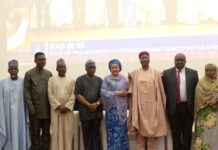The Economist, the international weekly newspaper, has been steadfast and dutiful on its pursuit of a solitary narrative about Nigeria. Going by this newspaper’s disposition towards Nigeria, it appears there is only doom and gloom in the country; Nigeria is a place where the sun never rises; there is always darkness, chaos, and an abundance of pestilence and starving children. If I may add, Nigerians live in huts and swing from trees like monkeys.
I think this sombre colouring of Nigeria by the Economist comes from a place of complex. The newspaper founded about 178 years ago is respected for its journalism pedigree; it is a fine newspaper no doubt. But its pedigree does not confer on it infallibility. The Economist may not be guilty of spreading falsehood about Nigeria, but it comes short as regards ‘’that Western arrogance’’ in its reports on the country.
Let us face it. The Western media is where African stories are caricatured, twisted and contorted to fit into the atavistic narratives of those who once held the continent by the neck. When Ngozi Okonjo-Iweala, Nigeria’s former minister of finance, was elected as the director-general of the World Trade Organisation (WTO), Swiss newspapers – three of them (Luzerner Zeitung, Aargauer Zeitung and St. Galler Tagblatt) — shovelled away all her accomplishments and described her as a ‘’66-year-old Nigerian grandmother’’.
“This grandmother will become the new boss of WTO,” the headline of a report by Luzerner Zeitung read.
A distinguished woman; former minister of Africa’s most powerful nation; former World Bank vice-president, and the first woman and first African to be elected as the DG of the WTO. But these European newspapers deliberately ignored these obvious feats and minimised her with the sexist and racist title ‘’Nigerian grandmother’’.
The truth is in the eyes of the Western media, a Nigerian or African remains subhuman; destined to settle within the general phylum and cursed to remain at the shallow end of the gene-pool. We can always call out racism and sexism, but this does not change the governing conviction and mindset of those whose forbears took Africans captive as slaves.
The Western media exhibits the accustomed pigeonhole mentation on its reports on Africa. Poverty, war, insecurity dominate the Western media’s reports on the continent. This is while countries in Europe like Belarus, Ukraine, and Kosovo are torn by insecurity and their citizens tormented by czars. We cannot wish away our challenges, but Africa and Nigeria are not all gloom and doom.
In May 2021, The Economist reported that ‘Nigeria’s economy is stuck in a rut’; this while the UK where the newspaper is based had been witnessing negative growth owing to the COVID pandemic. The economy of many countries was devastated by the pandemic, but the newspaper beamed its laser on Nigeria.
In its recent article published on October 23, the newspaper said: ‘’Nigeria has been corrupt and turbulent for decades. What has changed of late, though, is that jihadism, organised crime and political violence have grown so intense and widespread that most of the country is sliding towards ungovernability.’’
I agree that Nigeria has been corrupt for decades. But Nigeria’s corruption is enabled and perpetuated by the home country of The Economist. The UK happens to be the preferred haven for stolen Nigerian wealth. The Pandora Papers revealed how some Nigerian public officers acquired questionable properties in the UK. The corrupt political class magic away Nigeria’s patrimony to the Queendom where the loot enjoys protection. Who is not guilty?
The UK is complicit in the corruption in Nigeria. The Economist should put its laser on the nexus of corruption — linking the home country to Nigeria. The P&ID scandal where some Irish and British businessmen colluded with Nigerian officials to swindle the country of billions of dollars using a bogus contract is still very much in reckoning. I dare say the UK is the biggest enabler of Nigeria’s corruption.
The newspaper said one of the reasons for the secessionism agitation in the south-east is so: “The Igbos, can walk off with all the country’s oil, the source of about half of government revenues’’. This is ridiculous. The south-south is Nigeria’s oil base, not the south-east. And those agitating for Biafra care little about oil. I think the Economist wove this narrative to suit a predetermined agenda.
The Economist also said: ‘’When violence erupts, the government does nothing or cracks heads almost indiscriminately. Nigeria’s army is mighty on paper. But many of its soldiers are “ghosts” who exist only on the payroll, and much of its equipment is stolen and sold to insurgents.’’
The newspaper betrayed the usual Western complex here. Columnist Mahmud Jega did a good job deconstructing this prejudice. He wrote: ‘’Nigeria’s military has been battling Boko Haram for only 12 years now, with a relatively meagre budget because the national treasury is beset by other problems. In contrast, the US military spent 20 years and $6 trillion battling the Taliban in Afghanistan. What was the result? Taliban is back in power in the country even as the Americans escaped with their tails behind their backs.
The British Army wasn’t any better in that respect. In twenty years until 1992, it proved wholly unable to defeat the Provisional Irish Republican Army [IRA], the “Provos” as they were called then, or even to end what the Irish called “The Troubles” in their province. It took the signing of the Good Friday Accord in 1992 to end the British Army’s agony.’’ Nigeria is not all corruption and insecurity, gloom and doom. I think the Nigerian media must begin to report beyond these typecasts. We give life to these labels – which the foreign media use against us.




